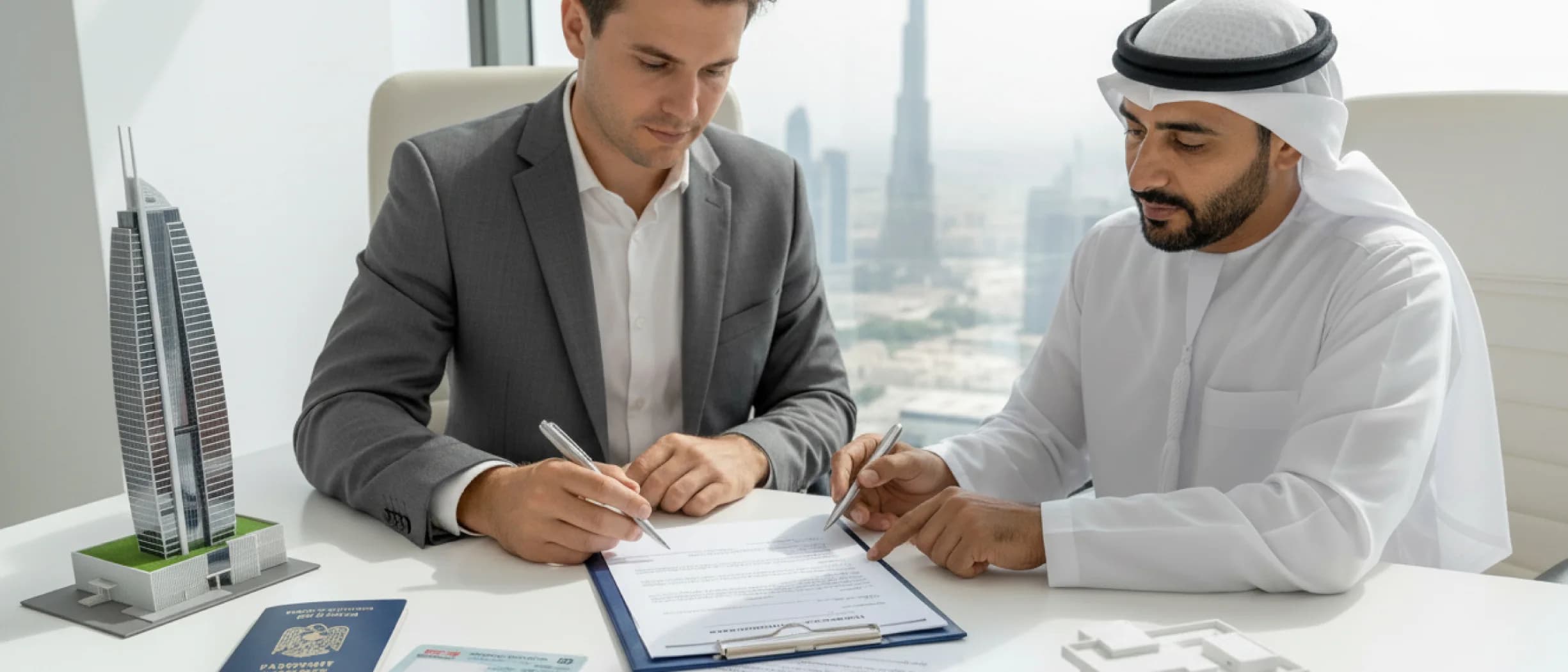
Adil Raza Khan | October 27, 2025

Dubai has remained appealing to international investors through its luxurious projects, high returns on rent and friendly investment climate. However, the question every foreign buyer would have before making an investment is – what is the property tax in Dubai for foreign buyers?
The good news: Dubai Property tax on foreign buyers is one of the lowest in the world as foreigners do not pay any property tax per year, no capital gains tax and no inheritance tax.
Dubai does not have recurring property taxes but a one-time fee structure — which makes Dubai the best destination among international investors regarding property taxes on international buyers worldwide.
As of 2025, the UAE new tax regulations of foreign investors have enhanced the state of transparency and online records even more, resulting in the ability of international buyers to transact with international smoothing.
Whether you are researching how can foreigners buy property in Dubai or assessing ROI, knowing these tax tricks will help you invest smart and confidently.
No — Dubai does not impose an annual property tax. When you buy a property, you will have full ownership with no current tax payments. The tax system in Dubai is not intended to deter foreign investment, as with most other international markets.
Nevertheless, investors pay one-time payments like the 4% Dubai Land Department (DLD) registration fee and annual service payments. These are not regarded as property taxes but as administrative expenditures.
The buyers also pay a commission fee of a real estate agent (usually 2% of the property's value) and an admin or trustee fee (approximately AED 4,000-5,000). They are simple, government-controlled, and transparent fees.
That is why the investment ecosystem is clear and stable. This makes the city a simple place to investigate for many international investors researching the possibility of foreigners buying property in Dubai (2025).
Therefore, when researching the cost of buying property in Dubai for foreigners, one must remember that these are your primary start-up costs - no hidden or annual property taxes later on.
No, foreigners are not charged property tax in UAE annually.
Nevertheless, all owners pay service or maintenance fees to maintain communal facilities, amenities, and areas. These are not taxes but management costs, which vary depending on the size and type of community (between AED 3 and AED 30 per sq. ft. per year).munal facilities, amenities, and areas. These are not taxes but management costs, which vary depending on the size and type of community (between AED 3 and AED 30 per sq. ft. per year).
This is the cost that sustains world-class communities such as – Downtown Dubai, Business Bay, and Palm Jumeirah.
Can foreigners buy property in Dubai? Yes – but owning real estate in the country guarantees the benefit of a tax-free ownership model with complete legal protection.
Foreign investors are allowed to own freehold property in certain designated areas where they are granted the rights to buy, sell, lease or transfer property.
To facilitate the ownership process, it is important to understand what documents foreigners need to buy property in the UAE. These typically include – a valid passport, documents of payment, and a signed sales agreement. UAE residents also provide an Emirates ID.
Dubai's property laws aim to safeguard local and foreign purchasers so that they have 100 per cent ownership and legal safety.
Yes, it is possible for foreign investors to request financing in the UAE. Mortgage facilities for non-residents are now available in local banks and usually cover 50-60 per cent of the property's value.
The information on how foreigners can apply for a mortgage in Dubai will assist buyers in planning their financial make-up accordingly – particularly in acquiring high-priced villas or off-plan development.
Such flexibility renders Dubai a competitive market worldwide – particularly with the UAE's new tax rules in 2025, which encourage transparency in property and mortgage documentation.
The new tax regulations 2025 in the UAE do not impose any new individual property taxes. Nonetheless, they pay attention to the compliance and transparency in accordance with the international standards. The property tax regulations in the UAE still lean towards long term investors by giving them the complete ownership rights in freehold zones.
Although foreign investors in the UAE are not obliged to pay property tax, corporate organizations that have annual rental income of more than AED 375,000 are required to make payments on the 9% federal corporate tax that was introduced in 2023. This is more applicable to firms than individuals.
As well, the 5 percent VAT provision on the initial sale of the new developments by developers is applicable and not on resale units.
These new tax regulations in UAE generally keep Dubai ranked among the world's safest and most rewarding real estate investments.
Whereas property taxes are practically nonexistent to foreigners in the UAE, to invest there, investors are required to pay some one time and recurrent fees which include:
These charges are related to transfer of ownership, maintenance of communities and government paperwork - not taxes. This awareness of these costs will allow investors to make proper judgment of the cost of buying property in Dubai by foreigners before making a purchase.
No, rental incomes do not receive income tax on individual landlords. But when the property is registered under a company, and the income is over AED 375,000, the corporate tax (9%) in UAE is to be paid.
This aligns with the new tax policies in the UAE 2025, where businesses are treated fairly, and personal investors are not undermined.
Individuals who seek to understand how foreigners may seek a mortgage in the UAE must also consider how incomes earned through rented houses are reported to be used.
UAE has signed more than 140 Double Taxation agreements with the nations across the globe and this means that foreign investors will not be taxed twice in the countries they are operating in Dubai and at home.
As an illustration – investors in the UK, France, or India enjoy an advantage of treaties eliminating multiple taxation on their incomes or gains from assets based in Dubai. This is an added benefit to property tax for foreign investors in the UAE compared to most developed markets.
No, Dubai does not charge inheritance or gift taxes; it is among the most investor-friendly market in the world. Nevertheless, there is a low transfer fee on property transfers (usually 0.125%-0.25%) when any title transfers through inheritance, family transfer or gifting.
Assuming that you are renting your property as a holiday home or an Airbnb, the Department of Tourism and Commerce Marketing (DTCM) in Dubai levies Tourism Dirham Fee of between AED 7-20 per night, based on the type of property.
This does not apply to UAE property tax regulations, but it does apply to investors who receive income from short-term rentals, particularly those who are considering investing in hotel apartments or serviced apartments.
Although the real estate market in Dubai is known to have no taxes, there are a couple of exceptions and conditional cases that foreign investors are expected to be familiar with:
The municipality fees or tourism taxes on revenue may be imposed on you in case you purchase a property – which is a hotel apartment or a commercial space. These are not real estate taxes, but business taxes.
A 5% VAT can be charged on the sale of new off-plan or commercial property, but this applies only to the developer's first-time sale and not to a resale.
Although there is no property tax in Dubai (per year), in certain Emirates (such as Abu Dhabi or Sharjah), there is a somewhat low rental municipality charge of 2 to 5%. These do not influence ownership, but they indicate more regional rules of UAE property taxation.
There is no inheritance tax in Dubai, but there are title transfer fees when ownership changes due to gifting or inheritance. At this point, it becomes necessary to see the UAE's new tax regulations in case a foreign investor intends to invest in the country in 2025, particularly in matters that pertain to estate planning.
The owners who rent their properties on Airbnb or as holiday homes are liable to the DTCM tourism fees based on the type of property.
On the whole, such exceptions are negligible and do not impact on the fact that Dubai ranks as one of the most tax-effective real estate markets in the world.
_1761394136.webp&w=1920&q=75)
The Property Tax for Foreign Investors in the UAE is easy, open, and investor friendly. Rental profits are not subject to income tax, capital gains on resales are not subject to tax and property ownership is not subject to a tax annually. The annual taxes do not exceed 3-5 in global cities, but in Dubai, the strategy enables investors to ensure high ROI and invest in the region with no doubts.
Since the UAE's new tax rules in 2025 upgrade to better reporting and compliance mechanisms, Dubai is establishing new standards of trust and digital transparency for investors. APIL Properties will continue to steer foreign investors through these dynamic frameworks, making everything clear, compliant, and profitable.
Yes. According to the new tax rules UAE 2025 – Dubai is still a tax haven of real estate investors. The Dubai property tax is restricted to a single-time property DLD fee and nominal service charges of 4%. Annual property taxes, capital gains, and no inheritance taxes are nonexistent and that guarantees total peace of mind to long-term investors.
Be it assessing the ability of foreigners to purchase property in Dubai, understanding what paperwork is required, or the ability of non-residents to take a mortgage, Dubai remains a clear, lucrative, and tax-friendly place to invest in.
APIL Properties assists foreign investors in the whole process; starting with due diligence and tax clarity until every acquisition is made in accordance with the changing Dubai investment and UAE property tax regulations.
No, Dubai does not charge annual property tax for foreigners or residents.
No, there is no capital gains tax on property sales in Dubai.
The 2025 UAE tax rules mainly clarify corporate tax and compliance, not new property taxes.
No, individual landlords don’t pay income tax; only companies may be subject to 9% corporate tax.
Yes, a 5% VAT applies only to the first sale of new properties from developers.
It’s the Dubai Land Department registration fee paid when buying a property.
Some Emirates charge small municipality or rental registration fees, not annual property tax.
No, Dubai has no inheritance tax, only small title transfer fees may apply.
They’re subject to a nightly Tourism Dirham fee, not an actual property tax.
To attract global investors and strengthen the UAE’s position as a real estate investment hub.

WRITTEN BY
Adil Khan is a Dubai luxury real estate expert with over 13 years of experience in the UAE property market. He is the Chairman of APIL Properties.

Buying Property in Dubai is one of the most rewarding investment moves expatriates can make, but only under the advice of licensed professionals who know the dynamic real estate environment of the UAE.
Dubai is one of the emerging property markets in the world, with thousands of international investors every year. Nevertheless, choosing a Dubai property agent is the only significant aspect of ensuring the market is transparent, compliant, and profitable in the long term.
It doesn't matter whether you are looking at off-plan property, high-end homes, or waterfront projects; with the right UAE property agent, you are guaranteed that your investment experience will be hassle-free and risk-free.

What documents do foreigners need to buy property in the UAE is one of the first questions international investors ask when considering Dubai or UAE real estate.
Dubai has a transparent property market, zero property tax, and a welcoming set of regulations to investor promotion, and as such, the purchase of property has become a trend among foreigners in 2025.
Whether you are buying property in Dubai, you need to know the legal steps. By ensuring that you get the right paperwork, you are guaranteed of a smooth transaction and also, the protection of your investment and the ability to make the purchase without delays.
This APIL Properties guide discusses the documentation needed to purchase a property in Dubai, exceptions for foreign buyers, and new regulations in 2025!

Dubai has remained appealing to international investors through its luxurious projects, high returns on rent and friendly investment climate. However, the question every foreign buyer would have before making an investment is – what is the property tax in Dubai for foreign buyers?
The good news: Dubai Property tax on foreign buyers is one of the lowest in the world as foreigners do not pay any property tax per year, no capital gains tax and no inheritance tax.
Dubai does not have recurring property taxes but a one-time fee structure — which makes Dubai the best destination among international investors regarding property taxes on international buyers worldwide.
As of 2025, the UAE new tax regulations of foreign investors have enhanced the state of transparency and online records even more, resulting in the ability of international buyers to transact with international smoothing.
Whether you are researching how can foreigners buy property in Dubai or assessing ROI, knowing these tax tricks will help you invest smart and confidently.